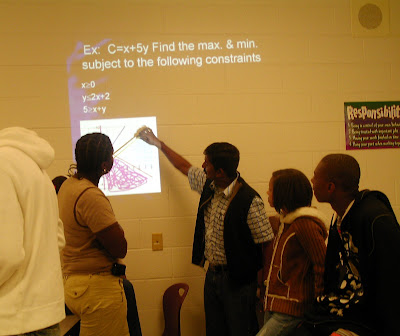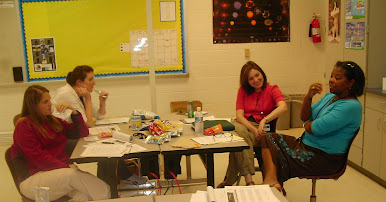
Here are the pictures from a classroom activity where I led a discussion with a group of students at the end of the class to deepen their understanding of the concept. Although I often plan to take such pictures, I tend to forget during the class or run out of time by the end. I use various tools to capture students’ attention, such as simultaneously projecting the operations of the TI-84 calculator on a projector screen while explaining the content using overhead projectors. I also create PowerPoint presentations and suitable worksheets for both class instruction and practice. As an Indian math teacher, I find that planning is typically done for you through textbooks. However, American classrooms present a different challenge. It’s not just about having the content in mind and being able to work through problems independently and instantly, while demonstrating them on the board; students need activities to keep them engaged throughout the lesson. If I’m not well-prepared on any given day, the class can quickly spiral out of control. Even when I am prepared, there are still days when certain students take the lead in disrupting the class. As a teacher, it’s essential to have a variety of ideas ready to engage students and hold their attention. I must cater to the differing needs of various students simultaneously. One might ask for a pencil, another may need to sharpen theirs because the lead broke, someone else could be dealing with a tissue issue, and another might raise their hand because they didn’t understand the first step of a problem. Additionally, someone might need to go to the restroom, while another student may distract themselves by checking a text message. There may even be students who cannot see the problem on the board because they forgot their glasses or have issues with their contact lenses. Sadly, all of these situations can arise at once while I’m still trying to teach and ensure the lesson is completed on time. Sometimes these requests can be quite trying, but other times they are genuine concerns. How do you handle this? In American classrooms, it’s important to stick to the rules and establish procedures. These procedures help shape classroom behavior. During new teacher orientation, one popular phrase is, "Don't smile till December." In the two and a half months I have been teaching, I had the opportunity to observe five different schools, and one thing that amazes me is the significant variation in student attitudes from school to school. Some first-year teachers have mentioned to me that students may even change their behavior from teacher to teacher. Interestingly, the same students may behave differently on different days with the same teacher. When freshmen enter my class with behavioral issues, it is often due to their relatively new transition into high school. Meanwhile, sophomores compare the technology I use with what they experienced the previous year. Many of them feel that my direct instruction denies them the opportunity to work on individual laptops for their projects. They are correct in their assessment, putting aside differences in culture and education systems. They wonder why we should struggle to understand a topic taught in a different way. Why can't the teacher communicate in a manner that makes sense to them? I recognize these thoughts running through their minds, and I want to respond patiently while doing my best to facilitate their learning. My point is that unless they try different approaches and methods, they will remain at the same level of knowledge. My goal is to learn the ways of r(t)eaching them as much as I can and implement what I discover in the classroom. Often, the results are very positive.
I understand that between a challenging beginning and a satisfying conclusion, there will be ups and downs.




